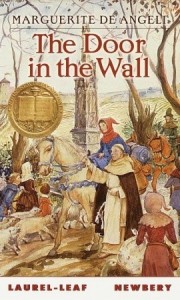Finding the Door
 The Door in the Wall by Marguerite de Angeli
When Robin loses the use of his legs, he loses the chance to become a knight like his father. But with the help of a kind monk and a wandering minstrel, maybe he can find his own sort of heroism in order to save the castle.
The Door in the Wall by Marguerite de Angeli
When Robin loses the use of his legs, he loses the chance to become a knight like his father. But with the help of a kind monk and a wandering minstrel, maybe he can find his own sort of heroism in order to save the castle.
This is not my usual genre. The Door in the Wall isn't fantasy, it's historical fiction. Nevertheless, there is something magical about this book. Robin lives in fourteenth century England, and at the beginning of the story, he has contracted some kind of illness resulting in paraplegia. You might think that a book about a crippled ten-year-old might be depressing, but you'd be wrong. Because of the way he faces his disability, Robin's tale is fun and encouraging.
He faced challenges but encountered none of the prejudice or misunderstanding that was probably aimed at those with disabilities in the Middle Ages. There was really only once that someone told him he couldn't do something. Not exactly realistic, but this is a middle grade book (geared for kids 9-12ish), so I wasn't expecting really heavy themes. Let's not scare the kiddies with lifelong infirmity, please. However, the theme that did come across loud and clear was extraordinary enough and one that some adults have plenty of trouble with: that when you come up against a hardship or challenge, there is always a way through. You just have to find the door in the wall.
One of the things that roped in my disability-and-all-its-quirks-obsessed mind was the friar who took Robin in and cared for him. Brother Luke not only feeds and bathes him, performing the role of care-giver, but he also massages Robin's back and legs and makes him build up his stamina by sitting up and then swimming. I kept wanting to point and say “Look! A fourteenth century physical therapist.” I don't know what illness Marguerite de Angeli had in mind when she wrote Robin – it could be any number of things from guillain barre to lyme disease – so I can't say how accurate his recovery is, but Robin regains some strength from all this. He can support his weight enough to get around on crutches, and he can swim like a fish (granted, a gimpy fish, but he doesn't drown which is the important thing).
As if care-giver and PT weren't enough, Brother Luke also takes on the role of counselor and occupational therapist. He teaches Robin carpentry, how to read and write, and how to sing and play the lute, giving him some very valuable emotional stability. Robin learns that he can be helpful and useful, even if he will never be a knight. Do you know how long it took me to realize that just because I couldn't be a PT, it didn't mean there wasn't something equally important I could be doing? I'll just say this ten-year-old kid beat me to it.
Sure Robin still frets about whether he can do certain things, and he worries about what his parents will think when they find out about his new limitations, but Brother Luke's efforts have given him a self confidence that would be the envy of most healthy adults. And when the castle is threatened, he steps forward to accept his role. In fact he's the only one with the right combination of skill and innocence to pull off the mission and he embraces it wholeheartedly, saving the castle and becoming a hero in his own right. Oh sorry, was that a spoiler? What? Did you really think he wasn't going to do it?
So you can see why I liked it so much. I thought it was highly deserving of the Newberry Medal it received. In 1949. Did I mention this was written in 1949? Seriously, some of the books I've read from this year aren't this enlightened. You can bet this is a book I'll be reading my kids just as soon as they're old enough to get past all the thees and thous.
